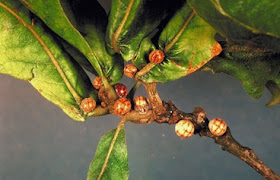 If you grew up singing old hymns you likely sang "Alas! and Did My Savior Bleed." The opening lyrics:
If you grew up singing old hymns you likely sang "Alas! and Did My Savior Bleed." The opening lyrics:Alas! and did my Savior bleedThat last bit--"For such a worm as I"--is notorious for being an example of what has been called "worm theology." Worm theology is an impulse in some Christian thinking that suggests, in light of God's holiness, that our self-concept should be characterized by self-abasement or self-debasement.
And did my Sovereign die?
Would He devote that sacred head
For such a worm as I?
(BTW, what is worse? Self-abasement or self-debasement? Or are they synonyms?)
On this subject, the search terms for this Friday that brought someone to this blog:
i am a worm
These terms linked to, unsurprisingly, my post from 2012 entitled "I Am a Worm."
That post had a botanical thrust in noting that the Hebrew word towla' translated as "worm" in Psalm 22.6 has two meanings. This is of interest because Psalm 22 gives the words of Christ's cry of dereliction from the cross:
Psalm 22.1a, 6Again, the Hebrew word for worm in Psalm 22.6 is towla' and it has two meanings--"worm" and "scarlet/crimson."
My God, my God, why have you forsaken me?
But I am a worm and not a man,
scorned by everyone, despised by the people.
In my 2012 post I made a connection between these two meanings and how both, in their conflation, point to the cry of dereliction on the cross:
The connection between the worm and the color red has to do with the fact that this particular worm was the "scarlet worm" (Kermes ilicis or Coccus ilicis). The Kermes worm is where we get the word crimson because this was the worm that was used to create red dye around the ancient Mediterranean. The worm isn't really a worm but a scale insect that attaches itself to trees, generally oaks, to feed off the sap (see picture above). Jesus would have seen the Kermes worm on Palestine Oaks (Quercus calliprino).
While affixed to the tree the female worm would give birth to a brood and then die. Toward the end of this cycle the mother's body would bloat and fill with a red fluid that would stain the tree. The ancients would collect these dead bodies and the eggs to make a crimson dye.
So the worm in Psalm 22.6 is an insect that leaves a crimson stain on a tree.
You missed Benedict's 7th degree of humility.
ReplyDeleteincredible!
ReplyDeleteooo... [chills]
ReplyDelete"You know the great Cimabue Crucifixion? I always think of that as an image – as a worm crawling down the cross." Francis Bacon
ReplyDeleteThe songwriter Brian Howard sings my kind of "worm theology" in "The Butterfly Song" (3rd verse):
ReplyDeleteIf I were a wiggly worm,
I'd thank you Lord that I could squirm;
If I were a fuzzy, wuzzy bear,
I'd thank you Lord for my fuzzy, wuzzy hair;
If I were a crocodile,
I'd thank you Lord for my great smile:
But I just thank you Father for making me - me!
Chorus:
For you gave me a heart and you gave me a smile,
You gave me Jesus and you made me your child:
And I just thank you Father for making me, me.
"Abase" suggests losing or voluntarily yielding dignity or prestige. "Debase" implies a deterioration of moral standard or character. To self-abase would be to lower one's estimation of oneself in terms of office, rank, prestige, or esteem. To self-debase would be more of a degradation related to shame and humiliation. Source: Webster's 9th Collegiate Dictionary
ReplyDeleteAs you know in the "Songs of Faith and Praise" hymnal, the word (worm) has been changed to such a "one" as I. I heard (not sure though) that the reason was that "worm" was just too offensive to describe oneself. It was this same reasoning that has led some congregations to ban "Amazing Grace" because many felt that "wretch" was way too harsh to describe their spiritual condition before conversion. I think those changes are worse than song leaders that pronounce "A-las!" as "At last." I can't help it, but every time they start with "at last," I think of Etta James singing that blues song.
ReplyDelete